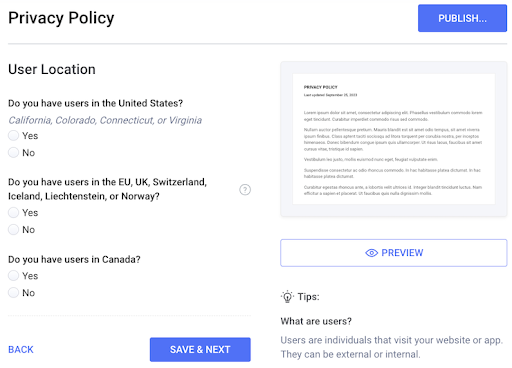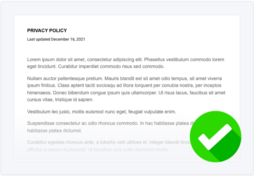A hotel website provides critical support that streamlines the booking process and enhances the customer experience while reducing pressure on hotel staff and management.
Since booking a room requires exchanging personal information, your website should have a privacy policy on your hotel website to ensure you meet legal requirements while reassuring your customers that their data is safe.
In this guide, I explain which laws apply to privacy policies for hotel websites, what you should include in yours, and how to easily make one.
- Creating a Hotel Site Privacy Policy
- What Is Privacy Policy?
- Which Privacy Laws Affect Hotel Websites?
- Does Your Hotel Website Legally Need a Privacy Policy?
- What Are the Benefits of Having a Privacy Policy on Your Hotel Website?
- What Should You Include In Your Hotel Website’s Privacy Policy?
- Where To Display Your Hotel Site’s Privacy Policy
- Summary
Creating a Hotel Site Privacy Policy
A hotel website privacy policy protects your legal rights and earns your site visitors’ confidence.
You can make a personalized privacy policy using Termly’s automatic generator, modify an existing template, or follow our detailed privacy policy guide.
Use a Privacy Policy Generator
The simplest way to make a privacy policy for your hotel website is to use Termly’s free Privacy Policy Generator.
At Termly, we’re also fully committed to protecting the privacy of our users.
Our comprehensive solution asks easy questions about your business and helps you align your business with applicable laws.
It then generates a unique policy based on your answers that you can embed directly on your site.
See what it looks like in the screenshot below.

Use a Template
If you want more flexibility and control over the contents of your policy, use our free privacy policy template for your hotel site.
Just fill in the blank sections of the template and tailor it to your hotel website’s legal and business requirements.
Our template completes most of the writing for you but leaves ample room so you can add important information specific to your hotel business.
Write It Yourself
You can also write your privacy policy from scratch — just be careful not to leave out any necessary details.
Your business may be fined if your privacy policy doesn’t meet all legal requirements outlined by applicable laws.
You can use our privacy policy writing guide to build a detailed privacy policy without overlooking crucial legal requirements.
What Is Privacy Policy?
A privacy policy is a legal document advising website users of your intention to collect and use their personal information and outlines details about:
- What personal data you collect
- How you use that data
- If you share it with any third parties
- The precautions you take to protect the data
- What rights your users have over their information, and how to act on them
- Your company contact information
Privacy policies are required by different data privacy laws, many of which apply to hotel websites around the globe.
Which Privacy Laws Affect Hotel Websites?
Since hotels can cater to customers anywhere, their websites must adhere to numerous federal, state, and international privacy laws, including the following:
- General Data Protection Regulation (GDPR)
- California Consumer Protection Act (CCPA)
- California Online Privacy Protection Act (CalOPPA)
- Children’s Online Privacy Protection Act (COPPA)
- Colorado Privacy Act (CPA)
- Connecticut Data Privacy Act (CTDPA)
- Utah Consumer Privacy Act (UCPA)
- Virginia Consumer Data Protection Act (VCDPA)
Some of these laws have monetary and data collection thresholds, like the CCPA and VCDPA.
But others, like the GDPR and CalOPPA, have broader scopes and apply if your hotel website services people in the regions they protect and if you monitor their online behaviors.
Does Your Hotel Website Legally Need a Privacy Policy?
Yes, your hotel website most likely legally needs a privacy policy, especially if it collects any of the following types of personal information from visitors:
- Customer’s first and last names
- Physical addresses, phone numbers, and email addresses
- Driver’s license number
- Date of birth and social security number
- IP address
- Geolocation
- Race, ethnicity, or national origin
- Gender or sexual orientation
- Political or religious convictions
- Immigration or citizenship status
- Payment information
- Medical information, including genetic or biometric data
- Physical description or other personal identification information
If your hotel website requires the client to create an account, their account details are also personal, including any account number, username, password, and login credentials.
What Are the Benefits of Having a Privacy Policy on Your Hotel Website?
A privacy policy for your hotel website offers numerous advantages, including the following.
Protects Your hotel Website From Legal Action and Penalties
Several data privacy laws apply to hotel websites, and as technology advances, these laws adapt, get amended, and new ones enter into action regularly.
Provides Customer Transparency
A comprehensive hotel website privacy policy addresses customer concerns immediately, building trust. Being transparent and clear about your website’s data-gathering methods helps ease your customers’ minds.
Complies with Third-Party Partner Requirements
Your hotel’s site may rely on using third-party services or apps, many of which require you to post a privacy policy as part of their terms of use agreement.
What Should You Include In Your Hotel Website’s Privacy Policy?
Your hotel site’s privacy policy should include the following details.
What Personal Data You Collect
Your privacy policy must address the full scope of personal information you intend to gather from your visitors, both online and in person.
Such information may include:
- Full names
- Account login information
- Credit card numbers
- Bank account details
- Addresses
- Phone numbers
To ensure it’s easy to read, consider listing all details in a bullet list or using a table to format this clause in your privacy policy.
How and Why You Collect Personal Data
Explain in your hotel website privacy policy how you gather personal data from your customers, for example:
- Online forms
- Account creation
- From external sources or third parties
- Publicly available information
You should also disclose whether your site gathers data using cookies and other tracking software. If so, post a separate cookie policy and link to it in your hotel website privacy policy.
Your privacy policy must also outline the ways you use different types of data — for instance, you might:
- Use the information to complete the booking
- Collect data to improve website operation
- Rely on the information to personalize the client experience
- Use it to enhance your marketing.
If laws like the GDPR apply to your hotel’s website, this must be one of five legal bases for collecting personal information.
Children’s Data
You must include a clause in your privacy policy explaining if you collect children’s data or not.
If so, you’re subject to following privacy guidelines outlined by strict laws like the Children’s Online Privacy Protection Act (COPPA).
If not, let parents and legal guardians know how to contact you if they suspect you’ve accidentally collected personal details about their child.
If You Share the Personal Data
As part of your privacy disclosures, clearly explain who has access to the data, including any third parties.
List the personal information categories you will share or sell to third parties and the categories of the third parties themselves.
For instance, you may provide a customer’s name or contact information to the concierge at their request.
How Long You Store Personal Data
Under laws like the GDPR, you must explain in your privacy policy how long you store and retain personal data.
Inform website visitors which information is automatically deleted and which may be retained for legal or business reasons.
Safety and Security Measures
Explain in your hotel website’s privacy policy what safety and security measures you have in place to protect collected data from unauthorized access.
It’s up to you to protect this information, and data privacy laws like the GDPR and the CCPA hold you accountable if it’s ever compromised.
Your Use of Cookies or Other Trackers
You must explain in a clause in your privacy policy if your hotel website uses internet cookies and for what purposes.
Under most data privacy laws, internet cookies qualify as personal information.
Explanation of the Consumer’s Legal Rights and Options
Most data privacy laws require you to explain your users’ rights over their personal data and how they can act on them.
To avoid confusion, list all rights users have based on each privacy law that applies.
You must also explain if you provide your users with a Data Subject Access Request (DSAR) form or if there is a specific email address or phone number they should use to request to act on their rights.
Consumer legal rights over their data may include:
- The right to lodge complaints
- The right to request data erasure, object to collection, or corrections
- Do-not-track requests
- Opt-out of data processing
- Explanation of parental rights for information related to minors
How You Handle International Data Transfers
Indicate how your business handles international data transfers consistent with appropriate international privacy regulations, like the GDPR.
You should address in this clause how the personal data might transfer if the hotel website ever changes ownership.
Notification for Policy Updates
Your privacy policy should explain how you notify customers of updates to the policy.
If any legal requirements or company policies change, update your privacy policy to reflect these differences immediately.
Your Company Contact Information
Ensure you have a clause that includes working contact information for your company.
Doing so ensures your consumers know how to reach you if they have any questions, comments, or concerns regarding your privacy policy.
Where To Display Your Hotel Site’s Privacy Policy
You should display your hotel site’s privacy policy in the following locations:
- In the footer of your website
- On any account creation pages
- On the booking page of your site
- As a pop-up window
- As an option in a drop-down menu
You must provide a physical copy of your privacy policy upon the customer’s request.
Since your hotel website may need to post additional legal policies, consider making a specific privacy center on your website and link to all policies there.
Summary
A clear and comprehensive privacy policy is critical for any modern hotel website.
Your hotel’s website privacy policy addresses necessary data privacy laws and legal requirements while establishing trust between the hotel and its customers.
The consequences of a privacy policy violation can be severe — don’t risk hefty fines and legal actions by trying to meet the complicated legal requirements on your own.
You can easily make a privacy policy for your unique hotel website using Termly’s convenient free Privacy Policy Generator.


